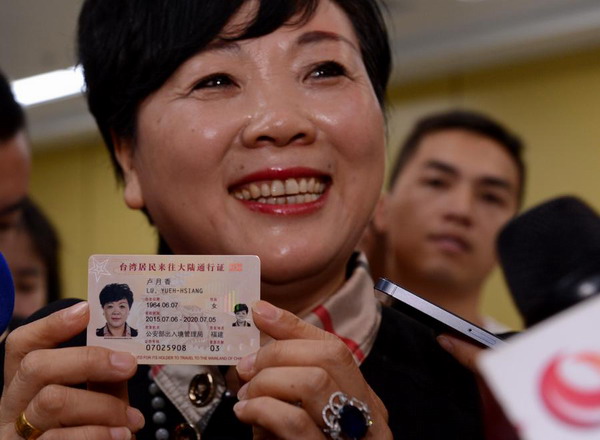Mainland to keep helping residents of Taiwan despite island obstacles


The mainland will continue to help Taiwan residents who live and work on the mainland realize self-development despite obstacles that have been created by the island authority, Zhu Fenglian, spokeswoman for the State Council Taiwan Affairs Office, said on Wednesday.
Zhu said that the policies issued by the mainland are welcomed by Taiwan residents and that there are tens of thousands of Taiwan compatriots working in mainland universities, research institutes, hospitals and various enterprises and institutions.
Last year, the mainland unveiled preferential policies, known as "31 measures", that aim to provide Taiwan residents living on the mainland the same treatment as mainland people. This month, new policies, called "26 measures", were introduced that benefit Taiwan-funded companies on the mainland.
Over the past year, Taiwan enterprises have gained many opportunities and benefits by participating in major action plans, research and development projects and infrastructure construction on the mainland, Zhu said.
For example, the valves produced by Taiwan enterprise Karon Holding Co were used in the construction of the new Beijing Daxing International Airport. Agricultural machinery products produced by Taiwan manufacturers were listed in the catalog of the mainland's subsidized machinery purchases, according to the office.
Citing data from the Ministry of Commerce, Zhu said that from January to October, the mainland approved 4,350 Taiwan-funded projects, an increase of 10.9 percent year-on-year, with an investment of $1.5 billion, an increase of 35 percent year-on-year.
"The mainland was, is and will continue to be the best choice for Taiwan residents to invest and do business," she said.
She added that the mainland will continue to create conditions for Taiwan compatriots to participate extensively in the mainland's economic development. In fact, next week, about 500 cross-Straits officials and other participants will attend an event in Shanghai aimed at promoting the integration of Taiwan businesspeople into the development of the Yangtze River Delta region.
Zhu also said that in recent years, the mainland has provided Taiwan residents with more and better employment opportunities and helped them solve their practical difficulties in finding jobs.
Last year, the mainland opened 134 vocational qualification tests to Taiwan residents, and about 800 Taiwan residents have obtained qualifications.
For example, 81 people have been certified in the legal profession and 48 got tourist guide passes, according to the office.
However, the island authority has been creating obstacles.
It recently rejected administrative lawsuits filed by 30 Taiwan residents after they were punished by the island for serving as assistants to community directors in Xiamen, Fujian province.
The island authority said those residents had breached laws that ban them from working for local governments on the mainland. The authority also said investigations will continue into other cases of alleged illegal employment of Taiwan residents on the mainland.
In response, Zhu said the assistants from Taiwan signed employment contracts with local companies, not the government, and their duties as assistants include village and community development, traditional cultural protection and cultivating volunteers in communities.
"We provide them with employment opportunities, and they want to develop themselves better. It is a simple thing," she said.
"However, the island authority has set up many obstacles, threatening people with so-called violation of laws.
"By doing so, they are in fact destroying the jobs of these young people."
- Survivor of Japan's 'comfort women' system dies
- 19 foreigners among China's first officially certified hotpot chefs
- China approves new lunar sample research applications from institutions
- Fishing, Hunting festival opens at Chagan Lake in Jilin
- A glimpse of Xi's global insights through maxims quoted in 2024
- China's 'Ice City' cracks down on ticket scalping in winter tourism




































